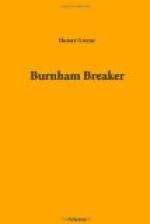On the floor of the mine was something that attracted his attention. He stooped and picked it up. It was a piece of paper.
There was writing on it in pencil, much faded now, but still distinct enough to be read. He held his lamp to it and examined it more closely. He could read writing very well, and this was written plainly. He began to read it aloud:—
“My DEAR WIFE,—I desire to supplement the letter sent to you from the office with this note written in the mine during a minute of waiting. I want to tell you that our Ralph is living; that he is here with me, standing this moment at my side.”
The paper dropped from the boy’s trembling fingers, and he stood for a minute awe-struck and breathless. Then he picked up the note and examined it again. It was the very one that Robert Burnham had written on the day of his death. Ralph recognized it by the crossed lines of red and blue marking the page into squares.
Without thinking that there might be any impropriety in doing so, he continued to read the letter as fast as his wildly beating heart and his eyes clouded with mist would let him.
“I have not time to tell you why and how I know, but, believe me, Margaret, there is no mistake. He is Ralph, the slate-picker, of whom I told you, who lives with Bachelor Billy. If he should survive this trying journey, take him immediately and bring him up as our son; if he should die, give him proper burial. We have set out on a perilous undertaking and some of us may not live through it. I write this note in case I should not see you again. It will be found on my person. Do not allow any one to persuade you that this boy is not our son. I know he is. I send love and greeting to you. I pray for God’s mercy and blessing on you and on our children.
“ROBERT.”
CHAPTER XXI.
A PERILOUS PASSAGE.
For many minutes Ralph stood, like one in a dream, holding the slip of paper tightly in his grasp. Then there came upon him, not suddenly, but very gently and sweetly, as the morning sunlight breaks into a western valley, the broad assurance that he was Robert Burnham’s son. Here was the declaration of that fact over the man’s own signature. That was enough; there was no need for him to question the writer’s sources of knowledge. Robert Burnham had been his ideal of truth and honor; he would have believed his lightest word against the solemn asseveration of thousands.
The flimsy lie coined by Rhyming Joe no longer had place in his mind. He cared nothing now for the weakness of Sharpman, for the cunning of Craft, for the verdict of the jury, for the judgment of the court; he knew, at last, that he was Robert Burnham’s son, and no power on earth could have shaken that belief by the breadth of a single hair.
The scene on the descending carriage the day his father died came back into his mind. He thought how the man had grasped his hands, crying, in a voice deep and earnest with conviction:—




